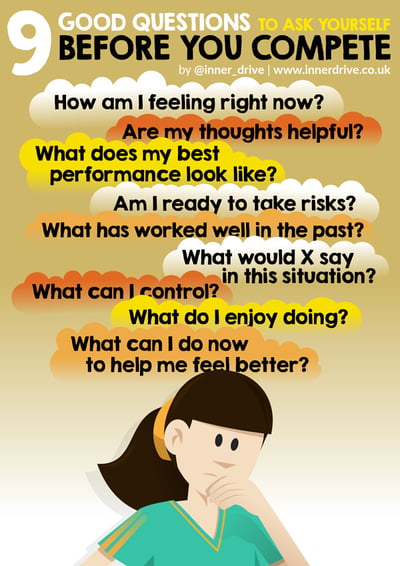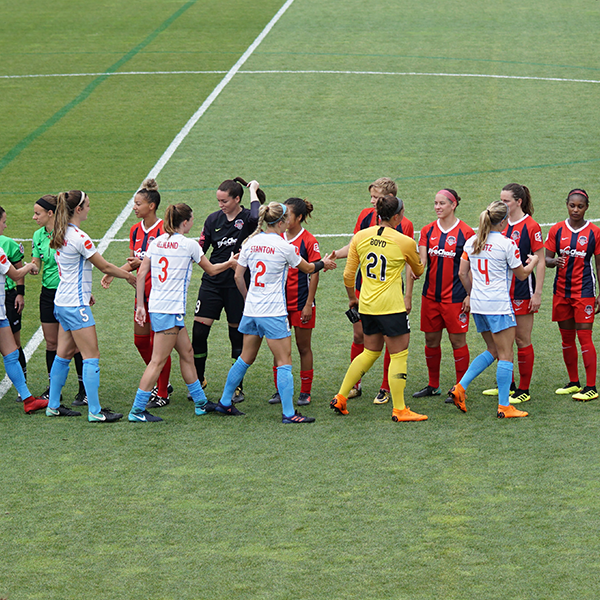How you talk to yourself in the lead up to and during competition will affect how you feel and subsequently how you perform. When we speak with our athletes, we always advise them to ask themselves questions. This is because it helps them learn more and perform better. So, what are the questions athletes should ask themselves and why?
How am I feeling right now?
Asking yourself how you are feeling is such a powerful question. This can help boost your self-awareness, which is the conscious knowledge of your thoughts and emotions. Those who are self-aware tend to act consciously, meaning that they make better decisions, are more positive and have higher levels of psychological health.
If the answer to this question is negative (i.e. “I feel nervous”), that’s okay. You can try reframing to look at things more positively. Some great ways to do this include treating the task out in front of you as an opportunity to improve rather than a threat or looking at what you have to gain rather than what you stand to lose. A quick example of this could be:
Original thought: “I feel really nervous because I don’t want to play badly”.
Reframed thought: “This match is an opportunity for me to have fun, put my practice into action and play my best”.
Are my thoughts helpful?
A great skill for any athlete is being able to question your thought process. This helps you become more aware of how you think but also catch unhelpful thoughts along the way. Your self-talk needs to be helpful for you to perform at your best. If you catch a negative or unhelpful thought when asking this question then saying “Stop” right after can halt the negative train of thought and follow it with more positive and helpful self-talk.
One of our favourite questions for better performance is a great follow up to this. We ask all of our athletes to ask themselves: “Is that fact or feeling?” This will always help you further question your thoughts and then start to reason with yourself and see the positives rather than the negatives.
What does my best performance look like?
Thinking about what playing at your best looks like is great before competing. A first benefit of this question is that it can improve your knowledge of your own performances. To use this, try writing down three things you do when you play at your best, then your behaviours (i.e., working hard, runs in behind, having fun), then finish off by thinking about how you could do these three things next time.
Another benefit of this question is that it can help to prompt and to improve visualisation. Learning and practice often involve creating vivid images of what you are trying to achieve and how you are going to achieve it. This helps you focus on what you need to do to play your best. Click here for a guide on how to visualise properly.
Am I ready to take risks?
Risks often allow athletes to perform at their best, but many don’t take risks at all. Fear of failure is a huge barrier to this. Psychologists have identified 5 main consequences that people tend to fear that failure will lead to:
- Experiencing shame and embarrassment
- Readjusting how you see yourself
- Having an uncertain future
- Upsetting important people
- Important people losing interest
A top tip is to identify which one of these fears stops you from taking risks and then try to reduce the fear itself. By asking this question, you reaffirm that risks are okay, but you also look at what risks you should take too.
A caveat here is that we are not suggesting that you take risks every time you compete. However, when asking this question, you should work out what level of risk you are willing to accept as this will help you identify when and how to take risks.
What has worked well in the past?
To explain how confident a person is at completing a task, psychologists use the term self-efficacy. One of the key parts of self-efficacy is to remind yourself of previous positive experiences. Essentially, by reminding yourself of what has worked well before and how you can do this again will increase your self-belief, which is key to performing well.
A great way to remind yourself of past performances is using self-reflection. We always advise athletes to keep a diary to log their performances and it works really well for all of them. This can also help you to unlock thoughts and emotions you might otherwise have disregarded.
What would X say in this situation?
When people become stressed, nervous or complacent in their preparation it is often because they are thinking very rigidly – which can be harmful for well-being and performance. Asking yourself this question allows you to explore alternative ways of thinking you could have otherwise forgotten about or not considered in the first place.
This question works best when the person you are thinking about has great knowledge about the situation you are in or someone you trust that often gives you good advice.
A great way to learn is from watching other people and thinking about their performances. Psychologists called this vicarious experience. It’s best to use it when that person is similar to you and their success is similar to what you want to achieve.
What can I control?
The brain craves two things: certainty and control.
Without these, we become stressed, nervous, anxious or even angry. By asking yourself what you can control, you can start to focus on the things that will give you a sense of certainty and confidence. Here is a quick guide to help you get your emotions in check in sports.
Elite athletes such as Tom Daley call this “being process focused”, which is focusing not on the outcome (i.e. the result, which they can’t control) but on what they need to do (the process) to give them the best chance of success.
What do I enjoy doing?
Asking yourself what you enjoy doing primarily gets you to think about the fun part of performing and the reasons why you do this in the first place. Athletes sometimes forget this and focus on what makes them nervous. Thinking about the enjoyment can help athletes harness excitement instead.
Enjoyment is also a massive source of confidence. The more athletes have fun, the better they play and thus the more confident they are. A great way to action this question is to ask yourself: “What three things do I enjoy doing the most?” By focusing on these, you will think about the excitement of performing as well as the things that make you perform better.
What can I do now to help me feel better?
There are a few reasons why this is a great question to ask yourself.
Firstly, it helps you develop your self-awareness. To understand what to do to feel better you first have to understand how you actually feel (this is sometimes called emotional intelligence).
Secondly, it helps you practice and use strategies to help your emotions become more positive. Simply put, those who can control their emotions the best perform the best.
Lastly, it helps you become more proactive as opposed to reactive. Thinking about this before you perform allows you to put strategies in place before bad thoughts have the chance to affect your performance.
Final Thought
Asking yourself questions like the 9 examples above may be the most effective way to help you develop your self-awareness, understand your emotions better and improve as an athlete. At InnerDrive, we challenge our athletes to pick three of these questions and question themselves before the perform. Now, it’s your turn to give it a go to!






